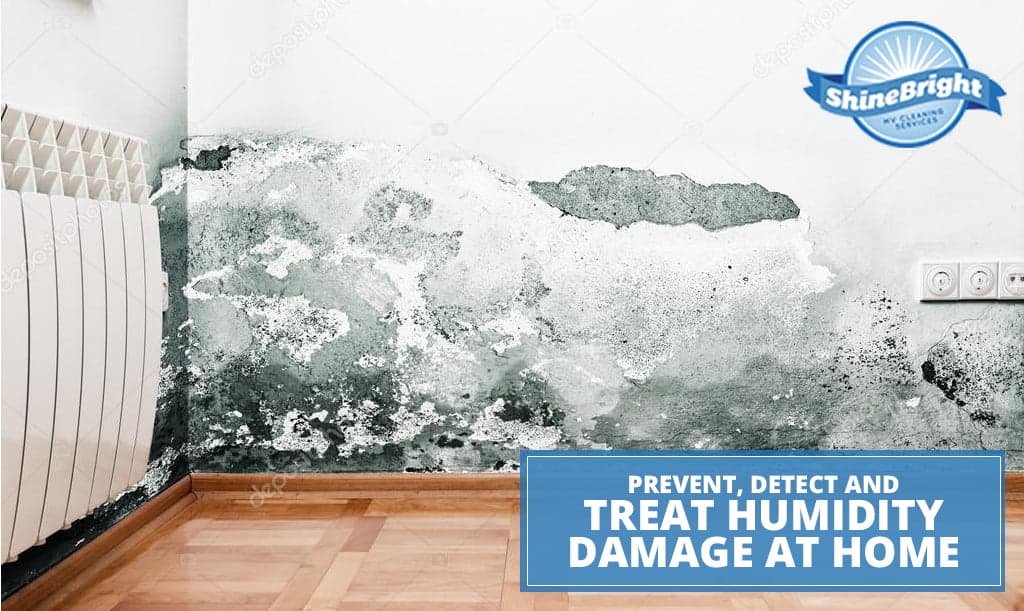
Underestimating the impact of humidity and moisture in your home is a common mistake. These factors not only contribute to the growth of mold and mildew, endangering your family's health, but they can also deteriorate the structure of your home. Unchecked moisture spells trouble, making it essential to learn how to detect and prevent damage before it becomes irreversible. Fortunately, controlling moisture levels is easier and more cost-effective than repairing the damage it causes.
Discover simple yet effective measures offered by professional house cleaning services to combat moisture and protect your home.
You’ll find it much easier to treat a problem if you know its origin, so before you get a handle on moisture damage, you’ll have to do some sleuthing. Regular problem areas in the house are usually the ones with poor ventilation and running water, like the bathroom, kitchen and sometimes even closets. Check for wet spots or dripping under the sink, behind the toilet, near the showerheads, etc.
However, balancing out the moisture levels in some areas of the house can be pretty difficult. These are attics and basements, and you’ll have to work around the limitations to properly ventilate them.
Check the plumbing all around and inside of your house. Chances are you’ll find a leak as the guilty party for wet spots and excessive moisture, but you’d still benefit from having regular checkups from a professional if you feel something is off.
Not all moisture problems come from dramatic sources like a broken or leaking pipe. Some can be fixed with a few simple measures, such as cleaning your floors and carpets regularly. Generally increasing the airflow that each room gets is a good idea, but if that’s not so easy for a particular room (like the basement and attic as we mentioned above) then a dehumidifier will be your best friend. Be careful not to dry out the air too much, though, since a lack of proper levels of moisture can lead to dry skin, rhinitis, unhealthy houseplants and even damage to wooden structures.
In the kitchen, don’t let pots uncovered while cooking, and if you have a wooden stove, make sure that you store the firewood outside, because it will let out moisture as it dries. Both in here and the bathroom, be sure to run the fans and vents outside instead of attics or crawl spaces.
If your house is sitting on concrete foundations, make sure that they have adequate exterior protection from water. If you have a dense garden that’s partly resting on your house, make sure that it’s properly trimmed and lets the air flow between it and the wall. While you’re outside, keep your rain gutters free from debris and in good shape, so they carry the water away from the house. Also, check if your sprinklers are not hitting the house when turned on.
If you’re getting wet spots around the house but you’ve already discarded all the obvious sources (drips, leaks, etc.), but you live in a humid climate, then look into your vented crawls. Supposing the dew point for that air is 75° F or above, and one of the surfaces is cooler than that, then that surface could be sucking up the water in the air.
Even during winter, the problems won’t stop. Accidental dehumidification (the air covering cold surfaces in water) can happen occasionally, but if it’s constant, then you’ll be facing wood rot and mold growth, which can be particularly devastating for a house if it happens inside of a wall cavity, which means you can’t see the problem until it’s too late.
Not knowing how to decrease the humidity levels in your house or damage is a risky game, and it can happen in both humid and cold weather. The plumbing should be the first thing you’ll want to look at, but if that doesn’t yield any results, you’ll have to maintain good habits to keep your humidity levels in check. Cleaning the house is a must, so planning a spring cleaning checklist is a good idea right now, even if you leave it to the professionals to sort that list out.